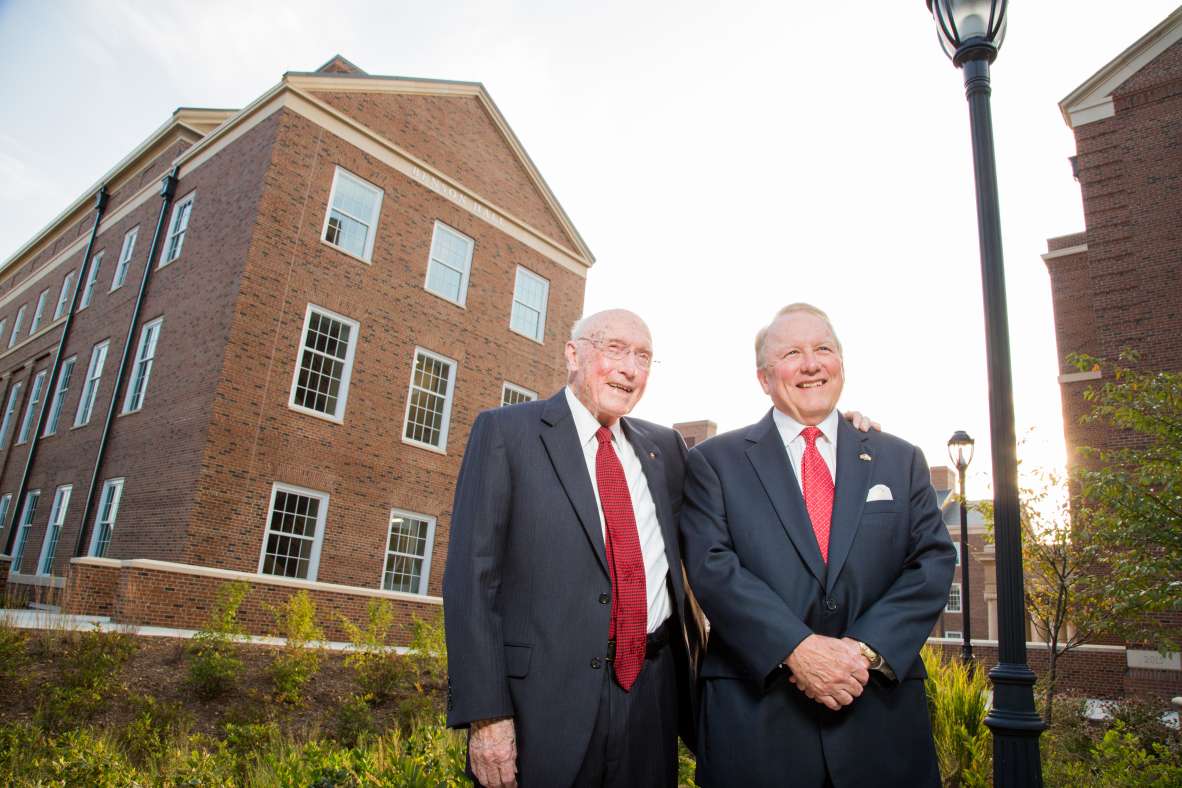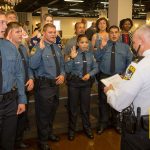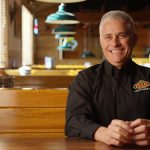“When I came back from the service I went to Chicago for six months to the American Baking Association. My dad wanted me up there, he said you’re going to work hard but the first six months you’re going up there and learn the intricacies of baking,” Ed says, remembering 1946 like it was yesterday. “I was never a baker but I learned enough of the fundamental science that the salespeople couldn’t pull the wool over my eyes.”
Ed understood. He learned.
Years later when Ed’s son, Larry, was in grade school, he would rise at 5:30 and sit by the curb waiting for the Benson’s bread man to pick him up.
“We delivered bread all morning to restaurants and retail grocery stores, I would help him carry the bread in, I helped him load his truck, I’d sit down and have coffee with him and his customers,” Larry says. “One of my other jobs was to sweep out the garage where the trucks loaded up. I remember throwing sweeping compound on the floor and it soaks up whatever is on the floor, so you could tell where you swept. I learned how hard the jobs were and learned how hard people worked. I grew up and learned from example.”
Larry understood. He learned.
For 100 years the Benson family has been in business in Athens and deeply invested in the community, all the while keeping close ties with the University of Georgia. Those connections grew even stronger this fall as Benson Hall joins Amos Hall and Moore-Rooker Hall in Phase II at Terry College’s Business Learning Community. The building is named in honor of the patriarch W. H. “Howard” Benson, his son H.E. “Ed” Benson and grandson Larry R. Benson.
The main feature throughout Benson Hall is classrooms: six large spaces where teaching takes place.
Students go there to understand. Students go there to learn.
• • •
A business’s history rests in the abilities of its people. For Ed, who has the benefit of seeing Benson’s from its infancy to its centennial, the success of his family business is simple.
“My dad was the entrepreneur, I was the manager and (Larry) was the marketer,” says Ed, chairman emeritus of Benson’s Inc. “You don’t give up. Hard work, leave your ego at home and take a basket of humility.”
In 1918 Howard Benson moved his family from Marietta and purchased a store specializing in baking, ice cream and candy on West Hancock Avenue in Athens. There he’d bake up breads and cakes in a small brick oven fired with cordwood and deliver them to routes in Winder, Jefferson and other small towns in North Georgia. In the first week of business, Benson’s Bakery boasted two horses, two wagons and a Ford truck — and took in $72.70 in sales.
Ed was born in 1921 (his sister Beverly in 1920), and Howard started buying up bakeries in Georgia towns — Milledgeville, Elberton, Gainesville. In Athens, Howard staged a citywide parade and celebration in 1924, with barbecue, music, “feature pictures” and a lecture from a local doctor on children’s health. In 1927, Benson’s was incorporated, and thriving (now with seven trucks). They said downtown Athens was filled with the smell of Benson’s baked bread.
But the Great Depression hit and dealt a blow to Benson’s. A document of “General Information” in the Benson archives at UGA’s Hargrett Library reads “Wall Street Market collapsed in 1929, followed by four years of horrible depression over the whole nation. We went broke, and far below.”
Broke, but never broken.
“My dad was a master marketer and a master salesperson and a master of ‘everything was going to be all right,’ it didn’t matter what it was,” Ed says. “He had optimism.”
The bakery kept going, making sure to benefit the community around it. Benson’s “authorized the Athens Salvation Army to pick up any number of loaves of bread necessary to see that no child in Athens went to bed hungry,” the document reads. “He would give to anybody that came by, it was just in him,” Ed says. “He literally did open the doors to anybody that was hungry.”
By the mid-1930s, the bakery was back on financial track and Ed, who graduated from Athens High in 1938, didn’t have to think hard on where to go to college.
“I was living at home. It was never any thought for me to go anywhere else,” Ed says of attending UGA.
A business major and letterman on the UGA golf team, Ed was in a fraternity and “really enjoyed school.” But the country was on the cusp of war, pointing Ed in the direction of ROTC where he trained to be a pilot. “I did University of Georgia civilian pilot training connected with ROTC and got about 200 hours of flying time and graduated as a shavetail, second lieutenant. I went from UGA in June of ’42 to the 48th Fighter Squadron.”
Nicknamed the Alley Cats, the 48th Fighter Squadron trained in California, and for Ed the trip west marked his first time being far away from home. While his plan to be a pilot didn’t work out, he was a good trainee and became an assistant intelligence officer and was sent to England before taking a transport ship to Oran, Algeria.
He remained with the squadron as it went to Morocco, Tunisia and Italy, where he helped the Allies’ planes prepare for attacks on enemy targets. He returned stateside in May 1944, instructing pilots transferring to the Pacific Theater, and left active duty in late 1945 as a captain. He came home to a family business pulling in the most profits it ever made.
During the war, Ed sent his paycheck to his dad who used that money to purchase a boarding house at the corner of Wray and Hull streets. Ed was a landowner, not knowing at the time that parcel of land would years later propel his business into a new and fruitful venture.
But first, baking school.
• • •
The recipe is straight-forward, if you have the equipment — 72 pounds of flour, 33 pounds of shortening, 80 pounds of pecans, 20 pounds each of golden, red and green pineapple, 33 pounds of whole eggs, 150 pounds of white raisins, 77 pounds of cherries. Add sugar (40 pounds), water, and 65 pounds of “special fruit” (there are some secrets) and you have a large batch of Old Home Fruit Cake.
You can’t tell the story of Benson’s without the fruitcake.
What started as a money-making venture for the Christmas holidays by the Athens Jaycees became a nationwide sales campaign reaching every state, making millions of dollars for civic organizations and giving nearly 600 college students one of the best summer jobs of their lives. And it was all because Ed Benson was up to the challenge.
Ed took over the company from his dad in 1958, but as the bakery’s general manager in 1953 debuted the fruitcake fundraising project, building it from a program selling to North Georgia communities to one reaching California. A massive ad campaign to sell a “good cake for a good cause” was found in a bevy of magazines — Reader’s Digest, Ladies’ Home Journal, Ebony — but it was the Benson Fleet, led by dozens of college men, who brought the fruitcake to the masses.
It began with a couple of UGA students one summer in the mid-1950s and became a summer crew of 50 strong by the mid-1960s, with as many as 250 college students applying for the job each year. After a weeklong training session, the 50 young men (the majority from UGA) got in their leased Fords or Chevrolets and hit the road for 10 weeks to sell as many orders of fruitcake as they could.
“You’re all out there on your own and you’ve got to manage your life, your work and get the job done by yourself,” says David Breedlove (ABJ ’68), who worked as a fruitcake salesman for three summers. “I have to believe that 95 percent of the people who went out on the road had great experiences and good memories of it all.”
Now in high school, Larry graduated from sweeping floors to hitting the road to sell fruitcake as well. During the summers of 1964 and ’65 he joined a college student on ventures to Northern California and Virginia.
“We sold a lot of fruitcake,” Larry remembers. “Lions, Kiwanis, Rotary, youth groups, anybody that sold a product to raise funds during the holiday, we had fruitcake for them.”
“When the fruitcake program came in we started growing literally 15 to 20 percent a year,” Ed says. “Fruitcake was great. During those times you could knock on a door, and we had 50 young men that went out and did just that all over the United States.”
Those times of knocking on doors would taper off, but another would open, thanks to a land investment made by Howard decades before.
• • •
“I’ll never forget this, I came off the golf course and went to see Jimmy (Dudley) and I said, ‘Would you like to get in the hotel business with me?’” Ed recalls from a moment 60 years ago. “I said, ‘I’ve got another good friend Harold Crow in the poultry business and you got a good brother and you have a good architect’ and we divvied it up.”
In the decade since first buying the boarding house in 1946, the Benson family purchased additional land in the area of Hull and Wray streets as lots became available. In September 1960, the lot became the Holiday Inn, a 66-room motor lodge that remains in business to this day (albeit with 143 more rooms on a wider swath of property).
It is the oldest continuously run Holiday Inn franchise in North America.
Benson’s was one of several businesses thriving in Athens at the time, and Ed was in a constant state of wanting to learn more. Companies such as Westinghouse and General Time set up in Athens, and their managers were “real managers, real citizens that got into the community,” Ed remembers, and they offered him advice he heeds to this day.
“They said to me, and this is a direct quote, ‘Ed, you are a good boy, but you don’t know what you’re doing. You’re growing but if you want to keep growing you’ve got to learn management, professional management, join the American Management Association. You have to join other meetings. You have to get out of Clarke County and see what’s going on,’” Ed says. “And I took them literally and from that time have been a management nut for the rest of my life.”
It’s why, when a few years later as Benson’s was looking to expand, Ed made a deal with his hotel partners to take over their portion of the business — “We worked it out,” he says, “Benson’s would buy them out and everyone would get the same amount.”
Ed became a strong voice in the community. A speech he made as Athens Chamber of Commerce president in 1966 centered on the future of Athens, making a firm call for better education, individual action and a modernization of downtown. The Athens Banner-Herald called the speech “one of the most important of these times” noting Ed was “a man who loves his community and not only wants the very best for it but is willing to shoulder more than his share of the responsibility for it.”
In 1971 Howard died at the age of 83. The day after he died, the Banner-Herald wrote an editorial about him, in which it noted “It would be difficult to name any service organization in Athens and the surrounding area which at some time has not benefited by his concern.”
Like father, like son.
• • •
About this time Larry was finishing his degree at UGA — “My dad said I could not come to the bakery and ascend to any kind of responsibility unless I had a college degree,” he remembers — and in 1974 was sent to Greenville, S.C., to run the thrift stores Benson’s had in the area. After getting control of them, he returned to Georgia and did the same for the thrift stores in Athens and Atlanta and was named the Atlanta Route Sales Supervisor. “I took over the thrift store and routes there and grew the business from four to six routes to 18 routes in a few years’ time and achieved our goal.”
Larry left Benson’s in 1978, though, to work for other companies and get “away from being the boss’s son.” He did that for several years, working at a bakery in Lakeland, Fla., and a milk and ice cream business in Albany, but came home in 1983 to become a bakery manager at the Benson’s plant in Bogart. The following years brought the end of Benson’s wholesale business, the divesting of the Greenville bakery and the reorganization of the Bogart facility.
In 1992 Larry took the reins of the company, and used his skills to move it into unchartered territory.
“My niche or expertise is in the marketing or sales business and going out and selling something to people, selling the quality, selling the service, selling the value,” Larry says.
And sensing an opportunity.
In the mid-1990s a major national retailer was looking to get into the grocery business and needed an angel food cake. “We made some special angel food cake for them,” Larry says. “We showed it to them, they liked what they saw, they liked how it tasted, so we got their business.”
They still sell angel food cake to that retailer — and pound cake and fruitcake too. When other major retailers decided to end their in-store bakeries, Benson’s won their business as well.
Then there were the hotels. Benson’s bought the Ramada Inn down Broad Street from the Holiday Inn, and transformed it into the Holiday Inn Express. The land where the old Benson’s Bakery sat downtown became the Hilton Garden Inn, a perfect hotel to complement the new Classic Center across the street. In 2008 a SpringHill Suites by Marriott was built in Oconee County, and next year another SpringHill Suites will open across the street from the Holiday Inn.
Plenty has changed in the 100 years since Howard Benson started selling bread and cakes — but for the Bensons, the locale has not. They invested in the Athens community as much as Athens invested in them.
“The things in my life that have counted have been my family, my church, our business, community service and Rotary and the University of Georgia,” Ed says. “These are the fundamentals. We have had the benefit of good luck and good health while living in the sweet spot of the United States.”
• • •
On a recent summer morning, Ed Benson led the way on a tour of his Bogart bakery. He stopped to shake the hands of several employees as he made his way through the rooms, where cakes were mixed, baked, cooled, cut, packaged and boxed. He marveled at the focus of the work teams, who from room to room worked with efficient precision. In one room, where employees deftly packaged four different slices of pound cake into one container at a rate of 15,000 in a 10-hour shift, he stopped and said “would you look at that?”
At 96 he remains curious about the world. And sometimes surprised.
Benson Hall was a surprise to Ed. “That was Larry,” he says. “I had no idea he was doing this thing to honor me.”
Ed has been a constant part and partner with UGA, leading various boards and committees, offering up his time and expertise, and in the late 1960s chairing the annual campaign that, at the time, brought in the most donations UGA ever had in one year (“$750,000,” Ed remembers with a laugh). His service earned him the college’s 1969 Distinguished Alumni Award, the 1984 Abraham Baldwin Award and the 1992 Alumni Merit Award from the Alumni Society.
“From 1955 until now I have never been out of touch with the University of Georgia,” Ed says. “They have been grand for us, and I hope that we’ve been able to help them.”
Benson Hall sits on Lumpkin Street, and heading up the hill from it you find the Holiday Inn. Around the corner are two more hotels built by the Bensons, while the original home of Benson’s Bakery is just blocks away. In a few blocks is 100 years of family history, with Benson Hall a beacon for centuries more.
“I wanted to invest in Terry College because of my dad and for my grandfather,” Larry says. “He didn’t want the recognition and I told him ‘I want to do this for you’ and he said, ‘Well I want my father to have some recognition for this good deed and I want you to have some recognition for this good deed.’ But I did it for him because he gave me the opportunity.
“My grandfather had the confidence in his son to give him the opportunity and dad has always been supportive of me through the good times and the bad times. He has never given up on me. He has been there for me forever and I wanted to invest in this opportunity for his legacy, for his service to the University, to the community, for giving people an opportunity to grow and prosper and be happy and financially secure.”




